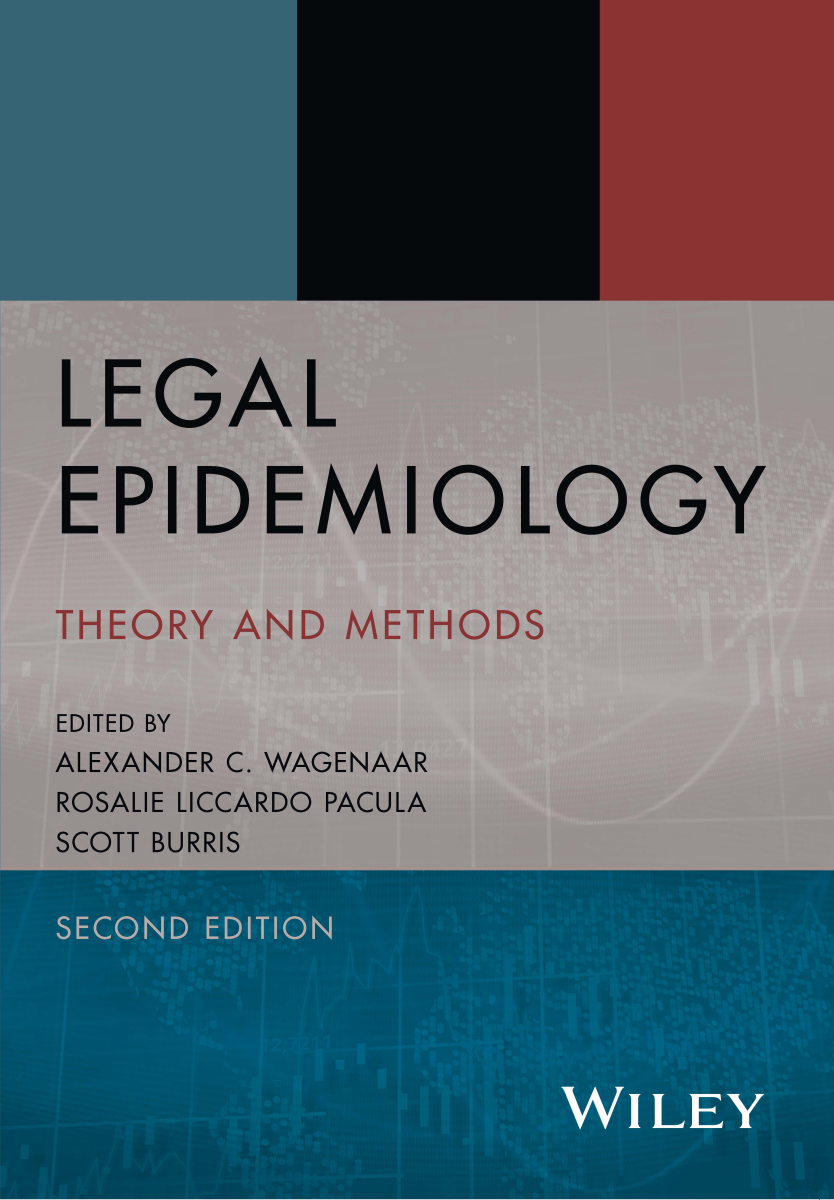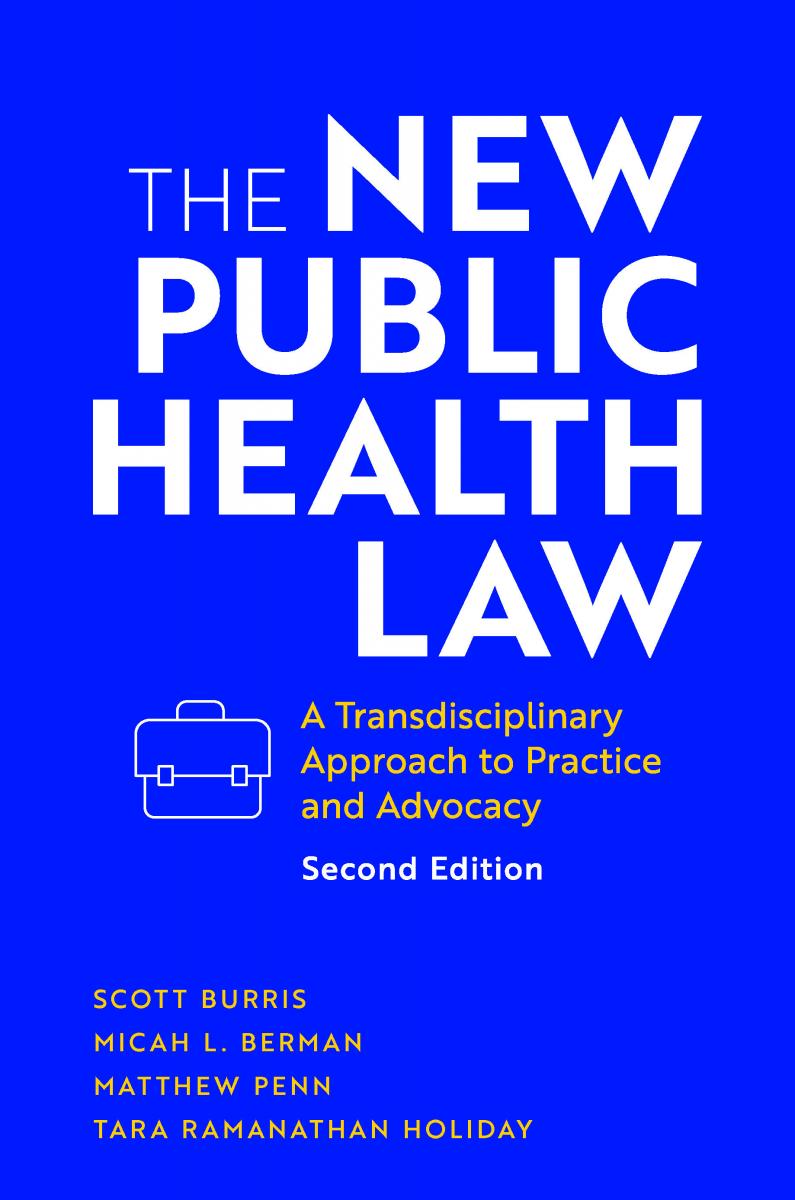The Center for Public Health Law Research strives to provide ample resources for anyone wanting to learn more about legal epidemiology. Legal epidemiology is the scientific study of and deployment of law as a factor in the cause, distribution, and prevention of disease and injury in a population.
Textbooks
 One of the most valuable resources when scientifically studying law is our textbook. Newly revised and published, Legal Epidemiology: Theory and Methods outlines the field's basic concepts from a team of 22 distinguished researchers from across a diverse set of social science disciplines.
One of the most valuable resources when scientifically studying law is our textbook. Newly revised and published, Legal Epidemiology: Theory and Methods outlines the field's basic concepts from a team of 22 distinguished researchers from across a diverse set of social science disciplines.
The resource is a thorough primer on the problems that arise in legal epidemiology–and potential solutions to those problems. The book also covers the special questions of measurement that arise when law is the independent variable and the various study designs for legal epidemiology.
Editors and experts in the field Alexander Wagenaar, Rosalie Liccardo Pacula, and Scott Burris draw on the expertise of more than 20 authors from a range of social, psychological, sociological, and sociolegal disciplines to guide better ways to understand, measure, and predict how much laws will influence health-relevant behaviors and environments.
This newly enhanced resource:
- Discusses the frameworks for legal epidemiology, including explorations of law in public health systems and services
- Examines how law influences behavior, including discussions of criminological theories, procedural justice theory, and economic theory
- Explores the design of legal epidemiology evaluations, including natural experiments, randomized trials, and qualitative research

The second edition of The New Public Health Law is the first textbook to arm lawyers and public health professionals of any background with the tools to fully exploit the potential of law to improve public health. Its transdisciplinary approach breaks down complex legal processes into discrete and understandable stages, making it an indispensable roadmap for the difficult work of crafting, monitoring, and improving public health laws.
This is the perfect guide for anyone looking to further understand the role of law in public health outcomes. It’s a great start for someone looking to comprehend the complexities of law in easy language and with a specific focus on public health.
Webinars and Self-Guided Training
The Center provides monthly training webinars in policy surveillance and advanced legal epidemiology topics. Our free monthly webinar series introduces introductory and advanced policy surveillance methods and applications. We offer two webinar series throughout the year: Introduction to Policy Surveillance and Legal Epi at Lunch.
Introduction to Policy Surveillance
This training provides a broad overview of policy surveillance methods and applications. Attendees will learn the differences between scientific legal mapping techniques (e.g., policy surveillance, legal assessments), the steps of the policy surveillance process, and uses for the data.
Legal Epi at Lunch: Advanced Topics and Methods in Scientific Legal Mapping and Legal Epidemiology
The Legal Epi at Lunch Webinar Series focuses on exploring in-depth methodological issues or approaches in scientific legal mapping and legal epidemiology research. Each one-hour session will include expert staff from the Center for Public Health Law Research and guest researchers and practitioners using legal epidemiology methods in a unique or innovative way and will offer best practices, technology solutions, tips, and tricks for attendees.
All previous webinar recordings are available for free on the Center’s website.
Self-Guided Policy Surveillance Training
The policy surveillance self-guided training features eight modules teaching each step needed to conduct policy surveillance. The modules include detailed instructions, as well as slide decks and links to tools and resources. We recommend viewing the modules sequentially.
Global Certificate in Legal Epidemiology
For those looking to take their scientific legal mapping knowledge even further, we offer the non-credit Global Certificate in Legal Epidemiology. This certificate is the first of its kind, allowing researchers to better understand the iterative process of policy surveillance.
In the three comprehensive modules, participants gain a deeper understanding of the foundations of legal epidemiology and the transdisciplinary model of public health law. The modules and subsequent units teach the foundational theories of legal epidemiology and skills and techniques used to evaluate the impact of laws and policies on health:
- The New Public Health Law – this four-unit module introduces the transdisciplinary model of public health law, the Five Essential Public Health Law Services, and the key doctrines of the United States and global public health law.
- Policy Surveillance – this three-unit module explores the history, process, and application of policy surveillance – a form of scientific legal mapping – and provides a step-by-step demonstration of the policy surveillance process.
- Legal Evaluation – in this two-unit module, participants will learn the basic principles of legal evaluation and the quasi-experimental design elements that are necessary to scientifically evaluate the impact of law on population health, a crucial part of legal epidemiology practice.
Graduate Certificate in Public Health Law Research
If you’re looking for a for-credit certificate, we offer this certificate by the Temple University College of Public Health and the Beasley School of Law in association with CPHLR. This is the first graduate-level certificate to provide fundamental training in public health law and legal epidemiology research methods.
The four courses in this 12-credit certificate are taught by faculty from the Temple University College of Public Health, the Beasley School of Law and staff at the Center for Public Health Law Research, which has built a theoretical foundation for the field, developed innovative research methods for policy evaluation, and is working on translational research in order to use evidence in improving public health practice.
As a student in the public health law certificate program, you will learn to
- conceptualize and design a public health law study,
- conduct a legal epidemiology study, evaluating the impacts of laws or policies under the mentorship of a graduate faculty member during an independent research project,
- demonstrate the integration of behavioral and organizational theory with a law or policy,
- describe the mechanism behind a law or policy,
- develop policy surveillance techniques for collecting and coding laws,
- learn to conduct statistical analysis, and
- systematically evaluate laws and policies on an individual level.
Policy Surveillance Institute
The annual Policy Surveillance Institute is the most comprehensive scientific legal mapping training hosted by the CPHLR.
The Policy Surveillance Institute teaches scientific legal mapping methods during a two-day intensive training seminar. The Institute is intended for individuals interested in studying policies and law once they are enacted and exploring variation in policy across jurisdictions and over time. Participants will learn each step in the policy surveillance process with live, virtual training from experts from CPHLR on policy surveillance software and through collaborative exercises.
This year, the Institute is happening in Philadelphia, October 5-6, 2023. For more details about the event, to see the agenda, and to register, visit the 2023 Institute page.
All of the training and resource procurement we develop focus on widespread dissemination of the theory and methods of legal epidemiology and policy surveillance. Here at the Center for Public Health Law Research, it’s our mission to build legal data and tools, advance and teach legal epidemiology methods and theory, and broadly share and translate evidence to support practice.
